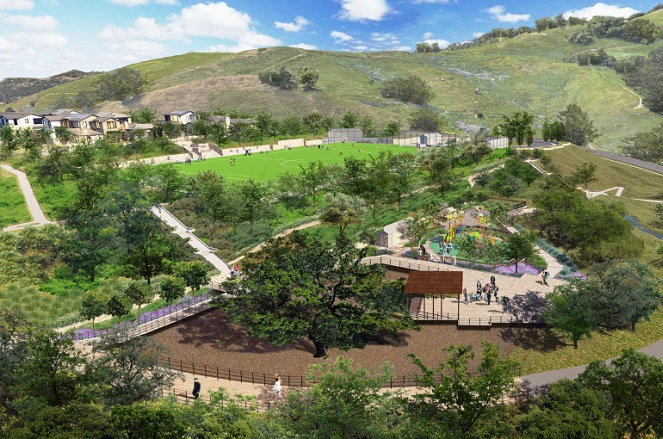
Measure L in Lafayette, Something to Consider
LAFAYETTE — May 1st, 2018 – Voters will decide on June 5 whether to allow 44 houses to be built on 22 acres, and while opponents have been vocal, they say they would prefer a scaled-down project.
The campaign surrounding Measure L has been contentious, with accusations of misinformation over air pollution, a sports field, a playground and traffic concerns; scare tactics; and threats of litigation pending the outcome.
The Lafayette City Council’s decision to hold a referendum on Deer Hill is itself rooted in controversy. In February, the council agreed to an election after a state appellate court ruled that city leaders had erred when they refused to allow the public to vote on proposed zoning changes on the site. Voters have to decide whether to accept or reject a 2015 ordinance that changed the zoning on the Deer Hill parcel to single-family residential.
What further complicates the election — and is looming as a potential option should Measure L fail — is the original plan for the site, a 315-unit apartment complex called the Terraces. The Terraces proposal, which first came before the city in 2011, was put on hold after the city negotiated the current 44-house plan, with amenities that would include a sports field and playground.
Other features of the Deer Hill plan include 11 acres of public parklands and trails; a 2.9-acre dog park; a 78-vehicle parking lot near Acalanes High School; and more than $500,000 in bicycle and pedestrian improvements such as a roundabout and walkways. The houses would range from 2,000- to 3,000-square feet and be priced at market rate.
Michael Griffiths, president of the preservationist group Save Lafayette, is opposed to the plan, saying the houses, sports field and playground will put people at risk because of unhealthy pollution levels and will add to traffic congestion.
“You can have a modified project,” Griffiths said. “Put the sports field somewhere else. That also gets rid of 60 percent of the traffic. Reduce the number of homes, maybe move them back from the polluted area a bit. Those kinds of things are a possibility.”
In 2015, Lafayette conducted an environmental impact report on the Terraces plan and concluded there would be no significant risk of air pollution with mitigation measures such as watering the construction site daily and installing air filters in the apartment residential ventilation systems.
In addition, a report was released last week by PlaceWorks of Berkeley, which was commissioned by the developer, O’Brien Land Company. The report confirmed no significant health risk and “no mitigation measures are required” based on air pollution standards by the state Office of Environmental Health Hazard Assessment and the Bay Area Air Quality Management District.
Save Lafayette says the Bay Area Air Quality Management District has identified Deer Hill as an area “with elevated levels of air pollution,” and cites an April 2 letter by environmental author James Leach of Sustainable Lafayette to the City Council. “My objection to constructing a sports field and play area at the Deer Hill project is that the level of air pollution close to Highway 24, Pleasant Hill Road and Deer Hill Road, is unhealthy for such activities,” Leach wrote. “These conditions are especially hazardous for children.”
“I’ve been on the City Council for 14 years and been through the whole process of the Terraces conversion to the Deer Hill project that we have today,” Lafayette Councilman Mike Anderson said. “Watching this whole process has given me a clear sense that this is a better alternative for that particular site.”
Anderson added: “There is a great deal of misinformation that’s being generated by those who are opposed to Measure L. It is not the assigned fact, and it’s basically being used to scare people. … We have folks who are simply making up things.”
The two sides disagree about what could happen if Measure L is defeated. Supporters say the private property’s developer could pursue the Terraces apartment plan. Opponents said the Terraces would be subject to another referendum vote, which supporters dispute.
Both sides are optimistic of their support. Yes on L’s spokeswoman Angela Ramirez Holmes cited a growing list of endorsers. These include: current and former mayors and current City Council members; Lafayette Chamber of Commerce members; Lafayette school board trustees; Lafayette Parks, Trails and Recreation Commission members; Sustainable Lafayette members; and several sports groups such as the Lafayette Little League and Lamorinda Rugby.
Griffiths is counting on the support in Lafayette that led to the defeat of Measure C, a city sales tax in 2016, as well as the city’s new, restrictive policy on conflict of interest. “With the conflict of interest (policy) a step in the right direction, if we can put this in the right direction, we can make a positive policy for the city and the voters,” Griffiths said. “Once the word gets out, we’ll win.”
Should Measure L win, Griffiths said, “litigation is a possible option, since the project appears to be inconsistent with numerous important land use policies.”
“There will always be some percentage of people who don’t want anything to happen,” said former Lafayette Mayor Brandt Andersson, a Measure L endorser. “I tell people that everybody who moved to Lafayette thought it was absolutely perfect the day they moved in — and any change to that is a direct assault on their future lives.”

